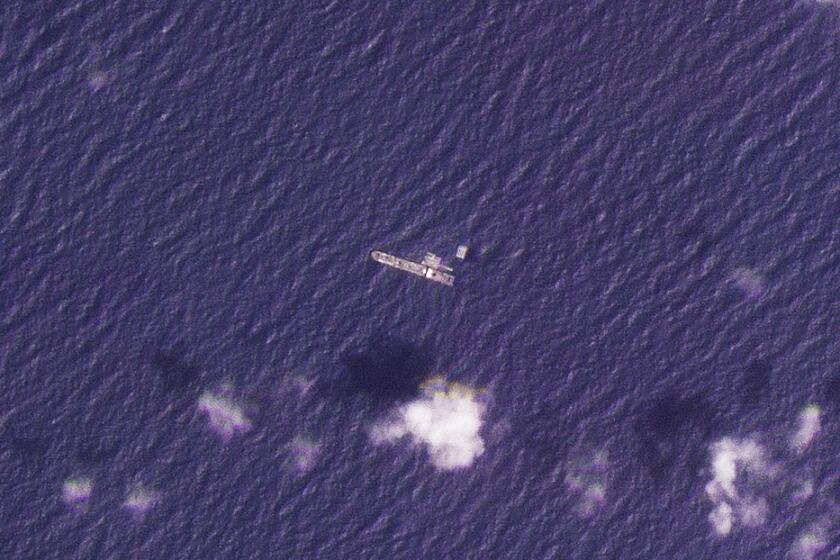Officials Accuse Each Other in Prison Scandal
A top military police officer and the commander of military interrogators at the Abu Ghraib prison in Iraq are blaming each other for improper treatment of prisoners who were stripped, abused and sexually humiliated.
Capt. Donald J. Reese, commander of the 372nd Military Police Company, told authorities that he was repeatedly assured by military interrogators that stripping Iraqis of their clothes was an approved tactic they used to “make the detainees uncomfortable.”
But Col. Thomas M. Pappas of the 205th Military Intelligence Brigade told authorities that stripping detainees was “inappropriate” and that he had personally ordered prison guards supervised by Reese to “have the detainees put their clothes back on.”
The sworn statements by the two officers, taken separately this year during an Army investigation by Maj. Gen. Antonio M. Taguba, were posted this week on the U.S. News & World Report website.
Scenes of nudity, captured in photographs, are at the heart of the widening inquiry into whether military police guarding the prison -- seven of whom have been criminally charged -- were solely to blame for the abuses or if military intelligence officials, who conducted interrogations of prisoners, were also culpable.
An Army decision, expected as early as next month, will determine whether others should be charged and whether more senior officers should be investigated.
Reese also portrayed Cpl. Charles A. Graner Jr., one of the military police facing court-martial, whom fellow soldiers have called the ringleader of the guards, as someone who should never have been put in charge of Tier 1A at Abu Ghraib because of his questionable record as a prison guard in Pennsylvania.
Reese said Graner “constantly challenges orders and requests from the leadership.”
After the abuse allegations surfaced, Reese said, he was told that Graner had a “long history” as an abusive guard in civilian life with “an extensive file, rather thick.” Had he known that, Reese said, Graner “wouldn’t even be in my company.... I wouldn’t have put him on a night shift in charge of a wing.”
Reese said he felt betrayed by Graner and Staff Sgt. Ivan L. “Chip” Frederick II, another guard who once worked in a civilian prison and is also charged in the Abu Ghraib case. “They were specifically put there for that reason,” he said. “I trusted them and I was relying on their knowledge and their experience to do the job.”
Reese and Pappas both have been officially reprimanded for not properly supervising their subordinates at the prison near Baghdad.
This summer, Reese testified at a military hearing against one of the guards charged in the case and said that on one occasion, when a detainee died during an interrogation session, he heard Pappas say, “I’m not going to go down alone for this.”
In the statements disclosed this week, Reese stressed that Pappas’ intelligence operatives were in charge of the prison and that they repeatedly urged guards to step up tactics to soften detainees.
That allegation is a centerpiece of the defense for the six guards still awaiting courts-martial: that they were only doing what they were told by military interrogators.
It is supported by the sworn statement of a higher-ranking military policeman, Maj. David DiNenna Sr., who said interrogators kept telling the guards to deprive detainees of sleep, play loud music and limit their food intake.
DiNenna, whose statement was also posted on the magazine’s website, told Army investigators that he believed the seven prison guards saw interrogators being rough with detainees and took it as a sign that they too could be aggressive.
“It would be my opinion that possibly these soldiers had seen similar, yet possibly not to this extreme, activity by the MI [military intelligence] personnel during interrogations of these prisoners,” DiNenna said. “They then took it upon themselves to conduct such criminal activity.”
Reese said that when he arrived at the prison in October, he was stunned to find so many inmates without clothes in the interrogation wing of Abu Ghraib. “My first reaction was, ‘Wow, there is a lot of nude people here,’ ” he said.
“I was told that it was an MI tactic that was used to make the detainees uncomfortable. There were many people way above my pay grade that walk through that wing and nothing was ever said about it. I was told it was OK, [that] nothing was illegal or wrong about it.”
But Reese also accepted responsibility for the seven guards who were charged. “The U.S. Army will probably not recover from this for a long time,” he said. “And I am ashamed of what my soldiers did and embarrassed as well.”
For his part, Pappas said Maj. Gen. Geoffrey D. Miller, who was in charge of operations at another prison camp at the U.S. naval base in Guantanamo Bay, Cuba, had encouraged the use of dogs, “with or without a muzzle,” at Abu Ghraib as a device to get inmates to talk.
“The key findings of his visit were that the interrogators and analysts develop a set of rules and limitations to guide interrogations, and provide dedicated MPs to support interrogations,” Pappas said of Miller.
But Pappas complained that there was no “established procedure” on how MPs should work under intelligence officers and that by January “there was confusion in the MP ranks as to who was responsible for the guard mission.”
More to Read
Start your day right
Sign up for Essential California for news, features and recommendations from the L.A. Times and beyond in your inbox six days a week.
You may occasionally receive promotional content from the Los Angeles Times.







